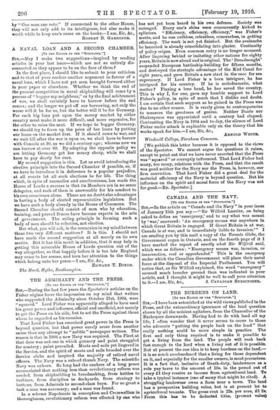A NAVAL LOAN AND A SECOND CHAMBER.
LTO TEE EDITOR OP THE "SPECTATOR."]
SIR,—May I make two suggestions—inspired by reading articles in your last issue—which are not so entirely dis- connected as they appear to be on the face of them P In the first place, I should like to submit to your criticism and to that of your readers another argument in favour of a naval loan, which I have not yet seen brought forward either in your paper or elsewhere. Whether we think the end of the present competition in naval shipbuilding will come by a process of " beggar-my-neighbour," or by the final arbitrament of war, we shall certainly have to borrow before the end comes; and the longer we put off our borrowing, not only the worse will it be for us, but the better will it be for Germany. For each big loan put upon the money' market by either country must make it more difficult, and more expensive, for the other to raise the next. If we hope to beggar Germany, we should try to force up the price of her loans by putting our loans on the market first. If it should come to war, and we wait till after the war is upon us, we shall have to borrow with Consols at 50, as we did a century ago ; whereas now we can borrow at over 80. By adopting the opposite policy we are letting Germany get her money cheap, while we shall have to pay dearly for ours.
My second suggestion is this. Let us avoid introducing the elective principle into the Second Chamber if possible, or, if we have to introduce it in deference to a popular prejudice, at all events let all such elections be for life. The thing which, in spite of anomalies and anachronisms, has made the House of Lords a success is that its Members are in no sense delegates, and each of them is answerable for his conduct to his own conscience alone. There are no doubt also advantages in having a body of elected representative legislators. But we have such a body already in the House of Commons. The Second Chamber should consist of men who by education, training, and proved fitness have become experts in the arts of government. The ruling principle in forming such a body of men should be selection, not election.
But what, you will ask, is the connexion in my mind between those two very different matters ? It is this. I should not have made the second suggestion at all merely on its own merits. But it has this merit in addition, that it may help in getting this miserable House of Lords question out of the way altogether, so that happily before it is too late England may come to her senses, and turn her attention to the things which belong unto her peace.—I am, Sir, &c.,








































 Previous page
Previous page